Arab leaders reject Putin's anti-ISIS coalition, suggest ousting Syria's Assad by force
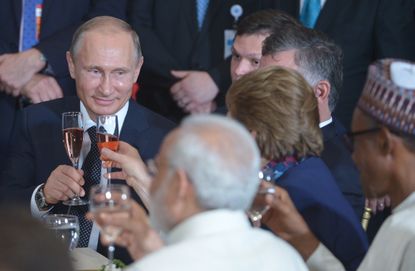

Russian President Vladimir Putin can count out Saudi Arabia and its Gulf Arab allies for its new anti-Islamic State coalition in Syria. Russia and Iran are ramping up military forces along Syria's Mediterranean coast to bolster the government of President Bashar al-Assad and, purportedly, fight ISIS — a goal the U.S. military says is low on Putin's priority list.
On Tuesday, Saudi Foreign Minister Adel al-Jebeir told reporters that "it's inconceivable that there will be a political solution with President Assad remaining in power," that a military solution to oust Assad was on the table, and that Putin's request that other Middle Eastern nations join his nascent coalition is a "non-starter." If Russia really wants to fight ISIS, he added, "they could join the existing international coalition." As for his country, al-Jubeir said the Saudis expect their support for the "moderate Syrian opposition that is fighting against President Assad... will continue and be intensified."
The U.S.-led anti-ISIS coalition is split between members willing to forge Syria's future in talks with Russia and Assad and those, like the Saudis, who are opposed to any role in Syria for Assad, or for Russia and Iran as long as they are propping Assad up militarily. On Tuesday, U.S. officials floated a proposal to include Russia and Iran in an effort to ease Assad from power during a defined transition period.
Subscribe to The Week
Escape your echo chamber. Get the facts behind the news, plus analysis from multiple perspectives.

Sign up for The Week's Free Newsletters
From our morning news briefing to a weekly Good News Newsletter, get the best of The Week delivered directly to your inbox.
From our morning news briefing to a weekly Good News Newsletter, get the best of The Week delivered directly to your inbox.
Create an account with the same email registered to your subscription to unlock access.
Sign up for Today's Best Articles in your inbox
A free daily email with the biggest news stories of the day – and the best features from TheWeek.com
Peter has worked as a news and culture writer and editor at The Week since the site's launch in 2008. He covers politics, world affairs, religion and cultural currents. His journalism career began as a copy editor at a financial newswire and has included editorial positions at The New York Times Magazine, Facts on File, and Oregon State University.
-
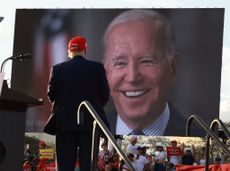 'Voters know Biden and Trump all too well'
'Voters know Biden and Trump all too well'Instant Opinion Opinion, comment and editorials of the day
By Harold Maass, The Week US Published
-
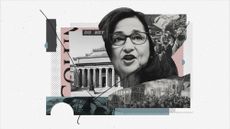 Is the Gaza war tearing US university campuses apart?
Is the Gaza war tearing US university campuses apart?Today's Big Question Protests at Columbia University, other institutions, pit free speech against student safety
By Joel Mathis, The Week US Published
-
 DOJ settles with Nassar victims for $138M
DOJ settles with Nassar victims for $138MSpeed Read The settlement includes 139 sexual abuse victims of the former USA Gymnastics doctor
By Justin Klawans, The Week US Published
-
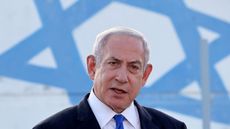 Israel proposes two-month pause in Gaza war in exchange for all Hamas hostages
Israel proposes two-month pause in Gaza war in exchange for all Hamas hostagesSpeed Read Deal doesn't include an agreement to end war, but might be 'the only path that could lead to a ceasefire', said US officials
By Harriet Marsden, The Week UK Published
-
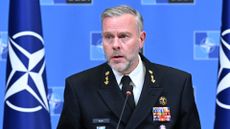 Nato official warns of all-out war with Russia in next 20 years
Nato official warns of all-out war with Russia in next 20 yearsSpeed Read Civilians must prepare for life-changing conflict and mass mobilisation, says military chief
By Harriet Marsden, The Week UK Published
-
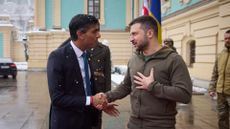 Rishi Sunak visits Kyiv to announce £2.5 billion in military support for Ukraine
Rishi Sunak visits Kyiv to announce £2.5 billion in military support for UkraineSpeed Read Surprise trip comes amid increased Russian bombardment and escalation of Middle East crisis
By Harriet Marsden, The Week UK Published
-
 British warship repels 'largest Houthi attack to date' in the Red Sea
British warship repels 'largest Houthi attack to date' in the Red SeaSpeed read Western allies warn of military response to Iranian-backed Yemeni rebels if attacks on ships continue
By Richard Windsor, The Week UK Published
-
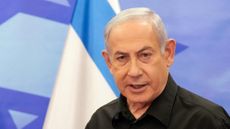 Israel preparing to flood Hamas tunnels with seawater
Israel preparing to flood Hamas tunnels with seawaterSpeed Read IDF pumps could drive out terrorists but critics warn of danger to hostages and Gaza water supply
By Harriet Marsden, The Week UK Published
-
 Houthi rebels claim Red Sea ship attacks
Houthi rebels claim Red Sea ship attacksspeed read Iran-backed Yemeni group vows to escalate aggression towards Israel-linked vessels in revenge for Gaza war
By Harriet Marsden, The Week UK Published
-
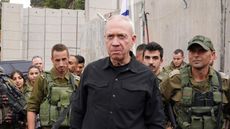 Israel plans next phase of Gaza war as first hostages released
Israel plans next phase of Gaza war as first hostages releasedSpeed read After four-day ceasefire 'we will not stop' until destruction of Hamas, says Israel
By Harriet Marsden, The Week UK Published
-
 Mob storms Russian airport 'looking for Jews'
Mob storms Russian airport 'looking for Jews'Speed Read Plane from Israel surrounded by rioters chanting antisemitic slogans after landing in Russia's Dagestan region
By The Week UK Published